Our guest editor this week is Graham Jones, author of Last Shop Standing: Whatever Happened to Record Shops?, a comprehensive and engaging look at how the UK went from having over 2000 independent record shops in the 1980s to just 269 by 2009.
On April 22nd a revised and updated edition of the book will be launched, exploring how this demise has been stemmed, indeed partially reversed, with a raft of new record shops opening since the original publication. In this extract, Jones asks some of the owners of those shops why they decided to open a record shop now…
“I opened a record shop as it was the best job I ever had, and as all the record shops in Chesterfield had closed down, I decided to open one myself. The first record shop I worked in was Richard’s Records in Canterbury, sadly one of the couple of thousand record shops which have closed over the last 20 years. I started there in 1984 and worked there until I moved to London in 1988 and managed to get a job working in the legendary Beggars Banquet record shop in Kingston-Upon-Thames. The shop sold new and second-hand, and many times we would have the same album at three different prices. This was due to us stocking the brand new version, a second-hand copy in good condition and a second-hand copy in not so good condition. My boss was Steve Walker, who used to be in the 4AD band Modern English. I left them to go and work for a CD and video chain called Alto in 1990 and ended up managing their Carnaby Street branch, before getting a job at Virgin Megastore’s head office as a product manager.
“In 1992 I gave up working when my second child was born, and was a housewife for the 10 years prior to opening the shop. In 2012 the much loved CE Hudson’s closed its doors. It was the oldest family-owned record shop in the world, having traded for 105 years. It left a void in the town, and it was clear Chesterfield still had the appetite for a record shop. CE Hudson’s was on the High Street, and I felt if I could find a cheaper location and concentrate on my great love of vinyl records, I could succeed.
“My hunch was right. I opened in 2013 and the shop is doing really well. I pondered about the name. Chesterfield is famous for our Church of St Mary’s and All Saints with its crooked spire. I thought of calling it ‘Spire Records’, but it seemed a bit obvious. As I have spent my whole life being told how tall I am (over 6 foot in my heels) I thought it would be a bit of fun to call the shop ‘Tallbird’. So if you are a vinyl fan passing by Chesterfield call in. I am the tall bird behind the counter.”
“Because I am mad”.
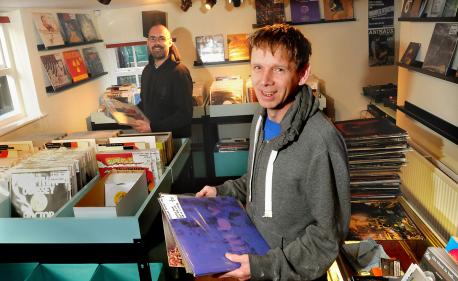
“We opened Earworm Records in 2013. We have both worked in record shops previously and decided the time was right to go for it ourselves. We do a mixture of new and used vinyl and cover pretty much every genre except classical – we thought it would be best to cover all grounds in a city this small. Our own background in music lies in the house, techno and disco side of things, but our knowledge broadens out into all other realms of the music industry. We also sell merchandise, books, CDs and tickets for local events. We also hold regular music-themed exhibitions and put on events for local artists and DJs”.
“Music is a terrible habit that simply won’t go away. Anyone who suffers from music knows that living with the condition requires a constant source of inspiration and total compromise of everything but music in order to support oneself. Like many who dare to admit to being a musician, I’ve selected an array of crap jobs in my very own crap town in order for me to spend my free time making or listening to music. I’ve loved each of the crap jobs I’ve done for having everything I’ve ever needed from a workplace. It needed to be: within walking distance; to be a process repetitive enough to occupy as small a part of the brain as possible; to have music playing from the moment I clock in till the moment I clock out; to provide a colleague or two to share the riff. And it had to be a workplace with plenty of coffee. The problem was the coffee was always crap. When I did clock out it always seemed like I had to travel a long way to find a good cup, and I don’t want to travel. I love my crap town. Its extreme averageness is extra-‘ordinary’, the people are cynical and the music keeps coming.
“So why did I open The LP Cafe? So I could do a job with everything I loved about my other crap jobs. What can be better than selling vinyl and listening to music all day while drinking copious amounts of quality coffee? We put on comedy nights. We have bands playing. We even have a board game club. Being my own boss I get the chance to go on the road to play with the two bands I am in, The Social Club and Wartgore Hellsnicker. I’m happy as a pig in shit.”
“I have been running a comic book shop in St Albans since 1991 called Chaos City Comics. In 2013 the unit next door became vacant. This coincided with our local HMV closing, and the fact that without us doing something the only places left to buy music in our city was from the local Oxfam Bookshop or Tesco Metro. We also wanted to reintroduce vinyl records to our customers. What people do not realise is St Albans has a rich musical heritage – being the birthplace of many famous acts from folk to rock to punk, such as The Zombies, Argent, Enter Shikari, Friendly Fires, Donovan, Dave Vanian (from the Damned), Tracy Thorn and Tim Rice.
“The city also has a thriving local scene and we wanted to reflect that in the shop. We sell both new and secondhand vinyl and CDs and associated accessories. Our biggest growth has been in the sale of retro-style record players. All these new vinyl fans need something to play their vinyl on and in December 2013 we sold over 60 retro turntables. The support we’ve had locally has been nothing short of phenomenal and we’re looking to build on this success into 2014 and beyond.”
“Since we were in our early teens my business partner Tom Thrasher and I have been making music in various bands, and more importantly building a collection of CDs and records that has excited and defined us throughout the stages of our youth. The collection that we have been individually amassing is important, because without listening to and exposing yourself to new artists and styles you cannot make music which stretches your ability or excites your friends and fans. It is also important because, like your bookshelf, it tells the world how you have begun to understand the world, and reminds you on a daily basis who you have gone to in every aspect of your life.
“I was working for a company called DMS that supplies the music industry with CDs and vinyl, and I saw first-hand how vinyl was starting to take off. When my friend and business partner approached me about starting a store to fulfil a lifelong dream, it seemed like the right time to do it.
“The record stores of our youth had all disappeared and we were left with the big HMV and a great second-hand record store called Really Good Records, but nothing else for the city. We acquired the unit next door to Really Good and filled it with new releases of any record we liked from any genre, and all of a sudden our personal collection entered the public realm. We started setting up events and instore gigs and installed a coffee machine so people could hang around. We have been scraping by with a smile on our face ever since we opened.”
“I have worked in the music business all my life, starting out at HMV’s flagship store at 363 Oxford Street, when vinyl LPs were still on the ground floor and the main focus of the business. Having moved through various aspects of the music business over the last 20 years (distribution, label management, band management and finally back to retail as head of music at Play.com) I realised that my real love was at the end of the chain on the shop floor, dealing directly with the product and the public.
“My business partner Ben Sommers and myself had taken over the running of a small venue (The Long Room) at the back of the Half Moon pub in Bishop’s Stortford. Having redecorated and given it a new logo, we had been busy booking bands, comedians, etc. to fill up the event diary. One evening Ben mentioned that he would love to open a record shop in the town as there hadn’t been anywhere selling music locally for some years. That got us thinking about where we could base a shop, or possibly have a market stall if rents were too high. The Eureka moment for us was realising that The Long Room was empty during the day and basing a record shop in there would work perfectly, a record shop in a pub.
“We’re called Moon Unit Records, partly as a nod to a hero of mine, Frank Zappa, and the fact that we’re renting a unit in the Half Moon. The idea was hatched on the 26th April 2013, and we opened for business on 26th August that same year. We sell new and second hand records, t-shirts, books, magazines and accessories and have our own Moon Unit Café in the front of the shop selling music-related dishes including the Madonna Kebab, Sergeant Pepper’s Lonely Hearts Club Sandwich, Morrissey’s Meat Is Murder Veggie Burger and my personal favourite, Meat Loaf’s Bap Out Of Hell.
“The great thing about us is that we combine three things that people like doing: eating, drinking and buying records. We are a great way to spend an afternoon.”
“Following some encouragement from a fellow record store owner I set up Mudshark Records in November 2013, after a successful eight years selling at Record Fairs in North Wales. Following the closure of Cob Records I felt there was an opportunity to set up in the university town, where there is an exciting music scene. The timing has been spot on as already the shop is popular, with its mix of young and old visiting the shop.”
“The main reason we opened Music’s Not Dead was we wanted people to have the experience of shopping in a record shop like we did when we were younger – as opposed to clicking a button on a computer – discovering something you might not have expected or heard. We also wanted to try and create a community around the shop, so we put on live gigs locally and try to get as many bands playing in the shop as well. It’s important people are reminded how music can change your life.
“We were told constantly that people were not interested in buying physical product. We thought this was nonsense and figured that people just weren’t getting the opportunity to do it. We are chuffed to have been proven right.”
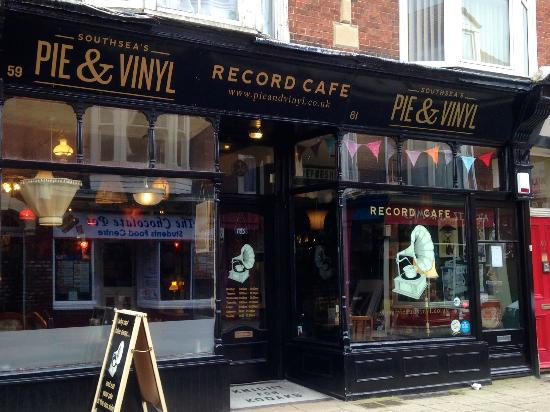
“I started playing around with the idea about three years ago, inspired by a dead end job at Estée Lauder, doing something that I was completely not interested in. I saw this as my great escape moment, and proceeded to start digging my tunnel to freedom underneath my desk. I figured that if this was going to be the sacred “now or never” moment, it had to be something I’d call my dream job. Being an extremely keen music fan from a very young age along with an obsessive personality, there was one thing in my life that had stayed constant: my love for music. I still feel that I’m on an eternal journey to find a piece of music or a song by someone that made me feel the way I did when I first heard a Neil Young record, watched Nirvana on MTV, and listened to The Beatles on tape in my dad’s car. In fact, my Dad was very keen on music, and was even in a band (Clint Cortell and the Confidentials; there, they made it into print at last!).
Along with the cliché of discovering my parents’ record collection and becoming inspired by it, I began to like exactly what my parents didn’t like. Trawling the numerous second-hand record shops around Portsmouth, I was in love with being in love with the Doors, Bob Dylan, the Grateful Dead, Eddie Cochran, and would pick up LPs more to hold and look at, than to play. I wanted to be the lizard king, and loved the romance, mystique and tragedy associated with music. I can remember going to record shops and people-watching, working out the way they lived, like some sort of alternative music Sherlock Holmes. Our shop Pie & Vinyl is situated on Castle Road, where Sir Arthur Conan Doyle first wrote A Study in Scarlet and the Sherlock story began. I can also remember the way the shops smelt, the minimal eye contact and unhelpful staff, treating the records that they sold more like their own collection that you weren’t allowed to touch.
“What did I know about music? I was 15. Maybe somewhere in the inner depths of my minimally spaced brain this stayed with me, and perhaps like vinyl I stored it somewhere and put it in the loft only to reopen and reinvestigate a few years later. So, back to sitting at my desk with people I didn’t really understand, doing things I didn’t want to do for someone I would never meet. I began buying a lot more vinyl, mainly because I thought it was a good deal, and became hooked on the far superior sound. I certainly don’t mind paying on average an extra £5 if the CD or download is included. You get so much more for your money, and it kind of forces you to take in the whole album as a complete piece of work. It was the ultimate way to purchase music by artists as far as I was concerned.
“I began to speculate if any other human beings thought the same way. I think this may catch on, this modern take on records. The thing about those second hand record shops is you always felt like you needed to know everything about the history of music before you were brave enough to ask a question. I would just sell this new modern format of vinyl, and would do my utmost to be as damn approachable and honest about any genre of music that folk would show any interest in, and possibly learn from our customers.
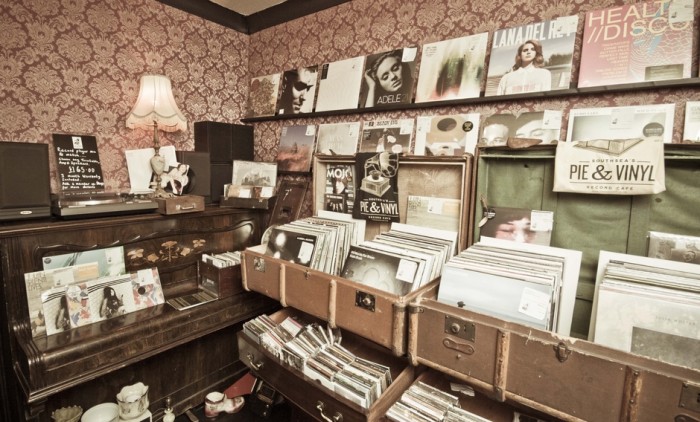
“As far as I knew record shops were dying. Why start a business that’s doomed to fail? The Daily Mail told me that music is dead. Oh yeah, I’m passionately in love with it, and like any great romance nothing is easy or ideal. This has to be something I believe in, no acting involved or I just won’t throw myself in. How about something completely different? An experience where I can stimulate all the senses: visual, auditory and taste. A record cafe! What foods? Something that replicates the experience of vinyl records; something old-fashioned, English, with lots of tradition; something that will satisfy the soul. It came to me in a flash: Pie and mash with gravy and liquor. You can put anything in a pie. I remember eating some fantastic pies at a music festival by a company called Pieminister, so made contact with them about stocking their pies.
“Southsea and Portsmouth has so much history, and so much potential. The decor had to have an old fashioned but comfortable look. We can sell screen-printed gig posters, and possibly hi-fi equipment. We will bring regular in-store performances to the city. We will work with local businesses, support them, we are all in this together. We will team up and tackle the monster that is the supermarkets. You can dream, but now I’ve got to be brave enough to make it happen.
“That was the start. Investigating the idea within the industry, everyone I communicated with seemed to get the idea and were immensely helpful. I touted the idea to chums, and after getting a few long faces (“crazy Courtnell, it’ll never work”, I could see in their eyes). My good friend Rob Litchfield was brave enough to get involved for precisely the same reasons. The rest is history. In November 2013 we expanded our little shop into something of a little big shop. We seem to have won the support of the people not only in Portsmouth and Southsea, but the surrounding areas and even nationally. We regularly hold in-store performances and we feel that this is just the start. The greatest thing about our journey so far is meeting so many amazing, likeminded people. More importantly, people are buying music again. Can you remember when you first hit the ‘return’ button on your keyboard, and downloaded your first song? Me neither, but I bet you will always remember the first record you bought in Pie&Vinyl.”
“I opened a record shop because of my passion for vinyl. The shop is tucked away in an arcade and I named it after my surname. We only sell vinyl at Cave records. I’m also an independent musician and after 10 years of playing up and down the country and living hand-to-mouth, what could be a better day job than running your own record shop? The plan is to branch out into a small independent label; I am starting with the release of my solo psych-pop mini-album on vinyl, with plans to put out limited-run vinyl releases for other local Shrewsbury musicians, of which there are many. All in all, Shrewsbury’s love of vinyl is strong and I stock both new and second-hand. I am thoroughly enjoying meeting like-minded people and welcoming them into what I jokingly describe as a much cleaner time capsule of my teenage bedroom”.
“Opening a record shop was a completely unplanned, spontaneous decision made by my wife Dawn and I. We had sold up our long-established car repair and skip hire businesses in Bucks and moved down to Swanage at the end of 2010, our children having grown up and gone their own way. We took a ‘gap year’ and just had fun doing what we wanted for the first time in our adult life, including a month in Italy. As we were downsizing, one of my tasks during that year was to reduce my own huge vinyl collection, so I started selling online and soon found myself trading instead of selling. Dawn and I were in the town one day in February 2012, walking through a new shopping arcade. As we walked past an empty shop I said something like: “That would make an ideal record shop”. Within an hour we were checking rent on the shop, and it was opened on March 1st. The change in every way has been positive. We live by the coast. We really enjoy the far more relaxed lifestyle. Running a record shop is far better than working.”
“Apart from odd jobs whilst I was at college, working in record stores is all I’ve ever done, and to be honest I wouldn’t change that for anything. I’ve worked for HMV and independents over the past 20-odd years, and in 2013 while I was travelling for the year I decided to open my own shop when I got back. I felt Birmingham was screaming out for record shops. It’s such a big city with such a big musical legacy, yet there are very few places for music lovers to gather and shop.
“I think there’s a lot of life left in record stores, hence the name of the shop: Left For Dead. Like those films where the hero takes a pasting and everyone thinks that he’s had it, but he comes back and proves people wrong. The mainstream media has been writing record stores off for years with the downloading thing, but people still like buying records and I think that’s set to continue with rising vinyl sales. I backed my judgement by opening the shop just before Christmas 2013. The shop is situated in the city’s famous Custard Factory which is an area of great cultural interest and full of independent shops.”
“Like most kids who were introduced to music in the early 1970s, my main diet was Radio 1 and Radio Luxembourg plus the weekly show Top of the Pops. Radio was on all the time during my early years, and it was not until I was nine that I was given a record player and my mother’s collections of middle-of-the-road singles from the 1960s. Funds were tight. A small amount of pocket money didn’t stretch far and my home town of Christchurch in Dorset, although it had a fairly large high street, only had a branch of Woolworths and a second hand shop called Exchange and Mart which sold any records. Buying new singles was beyond my budget, so the second hand store was my regular weekly call to spend those few pence. However I soon found out that Tuesday afternoons was a good time to visit Woolworths. The new chart was announced every Tuesday at lunchtime on Radio 1, and the local branch of Woolworths used to discount all the records that had dropped out of the Top 40 that week into their bargain bin. I was first there after school and got the goodies that were only a third of their usual price.
“At this time I was asked at school by my teacher, “What do you want to do when you grow up?”. I replied, “Work in a record shop. It would be a fantastic dream job’. The reply was along the lines, “That’s nice, but aim a little higher my boy”. I remember reading an article by Radio 1 DJ John Peel. It had a picture of him surrounded by records on his desk and the floor. In the article he said one of the best things about being a DJ is that you get all your records free. “Fantastic,” I thought. “That’s what I am going to do”. But it took a little while for me.
“Throughout the remainder of the 1970s my Saturdays always saw me going into nearby Bournemouth to walk around the many music outlets the town had. There was Stetchfields, which introduced me to the wonders of cheap imports. Derek’s, with its three floors of everything you could imagine. Uptown Records, which by 1977 had become the home of punk and new wave singles and Armadillo which to a 12-year-old was a bit scary, but always had an amazing selection of American artists I had never heard of. This continued until the early 1980s, when Bournemouth gained its first ILR radio station, Two Counties Radio. I soon got involved and managed to get myself a Saturday job there doing everything that no one else wanted to do. My payment for this work was that I could help myself to the massive chuck-out box of records that none of the presenters wanted. I would arrive home on Saturday evening with a bag full of free records, sometimes 40-50 singles a week. My dream had come true.
“I managed to make radio a full-time career and record shops kind of disappeared off my radar for a time, because everything I wanted I got free, so what was the point? Over the next 30 years I worked for not only ILR, but moved up to London and joined the BBC working as a producer across programmes on Radio 1, 2 and the World Service, in the process receiving every record, free, weeks before they came out. I even produced John Peel for a few years, and once over lunch told him about the story from the 1970s, and his article, and that that was why I was there now with him.
“During the next few years I did tend to visit some record shops, but not too often. There didn’t seem a real reason. But in the back of my mind I still had that other dream. What would it be like to run my own record shop?
“I left the BBC in 2006 and formed my own production company, producing a number of weekly shows for stations across the world, including a weekly chart show for BBC World Service. My family had moved to a village in North Dorset called Stalbridge. The house had a shop attached in which my wife had opened an interiors store, and out the back in the courtyard was an old coach house from the 19th Century. During the 20th Century it became a slaughter house and cold store for the butcher’s shop which occupied the front of the house.
“One day while telling my wife about your book Last Shop Standing, which I had just finished, I told her the dream I’d harboured of having a record shop since the 1970s. She said why not open one in the old coach house in the back. After a few days of thinking about it, I thought why not? It’s maybe 20 years too late, but what the hell?
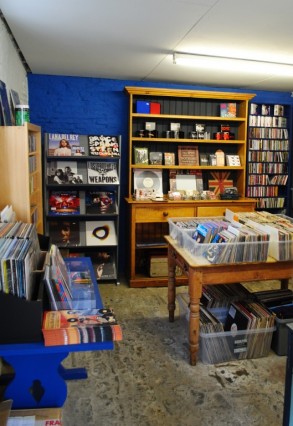
“So in March 2012 The Vault opened its doors in the old coach house-turned-slaughterhouse and now record shop. After 30 years of playing new records on the radio, I now had the task of trying to sell those same items to a declining record-buying public. It’s been a steep learning curve. Someone told me at the start, “Don’t just stock what you like, no one else will like it”. How true. It’s been a hard slog, but great fun. I have a hardcore of regulars from all sorts of backgrounds and they all have completely different tastes. I have learnt so much.
“I have had a couple of people come in and stand in the middle of shop and say in a very strong Dorset accents: “I remember killing the chickens, sheep and pigs in here, right here,” pointing at the floor, ‘And the blood used to run down there and out the door’. Try selling an André Rieu CD after that! I run the shop five days a week, and in the corner behind the counter I edit Top of the Pops: the Radio Show for the BBC World Service on my computer, plus make my other radio shows. My two worlds have merged.
“I am never going to retire rich on the shop. I may just break even one day. But it’s great fun in more ways than one.”
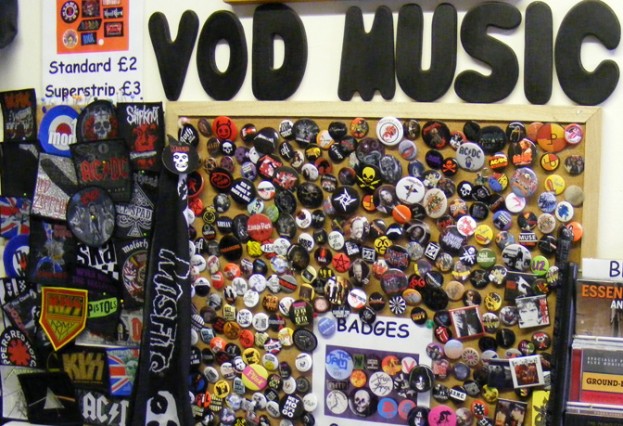
“Since 2006 I had organised record fairs around North Wales. Opening a record shop was a natural next step and in 2009 I opened the UK’s smallest record shop, a mere 70 square feet. It was previously an ice cream parlour, and I have turned what was the serving hatch into my counter. It is the record shop equivalent of the Tardis. Like a lot of things in life, big isn’t always best. Vod is worth a visit just to show what I have managed to cram into such a small space. I have had great support from the local community and I run the shop whilst still organising record fairs.”
“I can categorically, absolutely and irrefutably blame my brother for me being a vinyl addict, which led me down a rather long but unavoidable path to running a record shop. Growing up I suffered from the common younger sister affliction of trailing after my cool older brother and trying lamely to copy his interests. He was an avid collector of vinyl and every week brought some intriguing-sounding (and looking) album home and disappeared into the inaccessible vault of his bedroom. I would steal glances at incredible album covers and then be tormented by musical strains of which I had never heard. Upon occasion he might allow me to view the ritual of selecting, cleaning, spinning and reverently placing the needle down. I picked up the seemingly secret language of prog, NWOBHM, doom, thrash and alt, and became determined to be a part of this universe.
“My Saturday job facilitated limited funds to start collecting, and I carried on through college. Despite the drive toward CDs I kept the faith. The real world of finding a sensible career could not dampen my commitment to the great black plastic god, but space and finances began to dictate a need to use my knowledge to generate funds through buying and selling, and I found myself one of the first sellers on some new fad called the ‘online marketplace’. eBay was my virtual shop, but crucially it allowed me to indulge my other passion of antiques and I worked for my grandmother’s antique business. Following her retirement it seemed natural for me to become a record dealer full time and the exhausting process of standing at record fairs and internet sales became my 24/7 world.
“Eventually I longed to give up the travelling rep element of selling records and I felt that some internet sellers were beginning to exploit collectors, with overpricing becoming more commonplace. It was time to bring a real shop with real prices to the real collectors. Wolverhampton seemed a perfect place for Vinyl & Vintage. The shop is in its second year of trading so the mission to provide a clean, bright haven to browse, talk, explore, discover and indulge vinyl devotees seems to be resonating well. Vinyl is my passion and I am determined to make it as accessible as possible. That means reasonable pricing and good stock, but crucially it means not discriminating against anyone’s tastes. Whether you like obscure imports or mainstream pop, everyone is welcome.”
“The shop was opened in May 2011 by retired teacher George Robertson, and me. I was a hospital doctor so it was quite a change in lifestyle and salary. George had been dealing in used records for 25 years while teaching, and has a reputation for having one of the best quality record stalls in the UK. I’d been collecting records for years and had become one of his best customers, and we became firm friends despite the father-son sized age gap.
“We wanted our shop to be bright, clean and uncluttered, almost like a music boutique but without any of the pretentiousness or music snobbery that can be associated with some record shops. Our personalities are on the cheery side which I think has helped us befriend the record buyers of Edinburgh. We’ve discovered that the musicians of Edinburgh are a talented bunch too and now devote a section of shelving to local and Scottish bands and labels.
“The reason we opened the shop was that I realised that a career can get in the way of the things you really love doing. I thought it would be a fun way to spend some time and a nice break from the doctor work and George wanted to wind down the amount of record fairs he did. The opportunity came up for us to buy the premises, and keeping the overheads low made the venture viable.
“I’ve always felt comfortable in record shops and always get excited when record shopping. What gems will I find today? It’s great to be able to share that, and personally to be surrounded by the artwork and to be able to pluck a classic I know and love or something brand new to my ears off the shelf and give it a spin while at work. In 2014 I bought out George so now everything is down to me. I keep telling myself that it’s not a hobby, it’s a business. It just doesn’t feel like work at all. The business side is doing fine and we’re about to expand our opening hours. Work has never been so much fun.”
Graham Jones
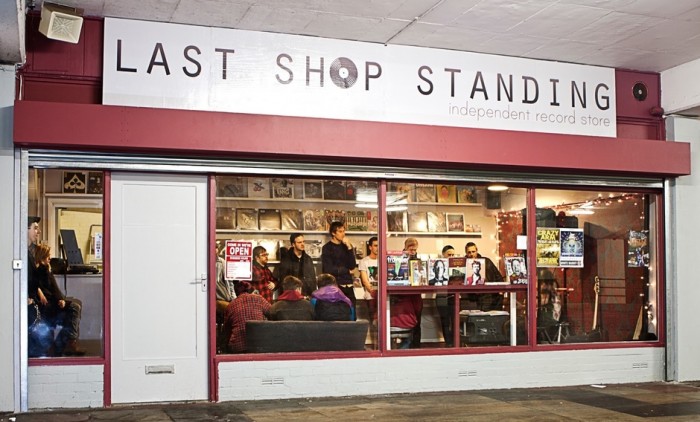
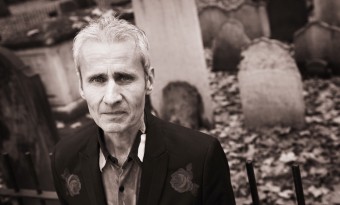

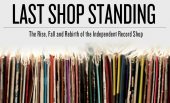

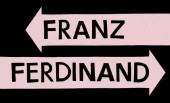
Follow us
Follow us on Facebook Follow us on Twitter Follow us on Google+ Subscribe our newsletter Add us to your feeds